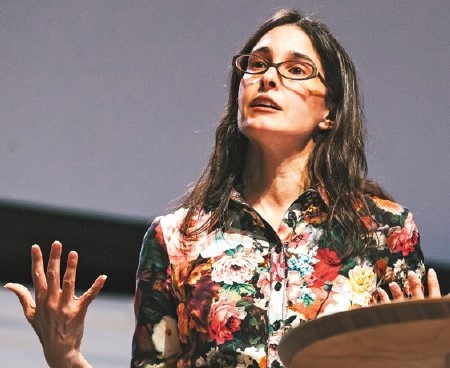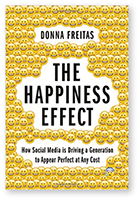Beyond the Warnings of Social Media
April 01, 2017

I met Aamir during an interview for my national study on social media, smartphones and young adults. A first-year college student, Aamir was studying politics at a university in the Southwest and had been involved in student government for as long as he could remember.
Tall, ambitious and sincere, Aamir told me he was active on social media and explained how, since middle school, his teachers had instructed him to maintain a “spotless” image online — a word Aamir repeated several times.
Aamir received guidance from teachers and advisers to gear all posts on social media toward an image that emphasized success, his accomplishments and upstanding, positive commentary and behavior. In high school, this highly filtered online behavior was mandated by the student government’s faculty advisers, and they actively monitored it.
“Our high school’s student council was extremely strict, especially if you were in leadership,” Aamir explained. “They had a very similar philosophy that the leaders should have, you know, spotless images on social media at home or wherever you are.” Even student politicians cannot afford missteps.
Reflecting Unreality
During the interviews for my study, one student after another spoke of similar advice they’d received from parents, teachers, coaches and college counselors — to always and only appear positive, happy, even inspiring, with anything they posted online attached to their real names. Many students were warned against posts that could be interpreted as slightly negative.
Emma, another young woman I interviewed and a veritable queen at her Greek-centered university, summed up an experience many other students did their best to articulate. Emma was smart (an honors student), stunning, and an officer at the top sorority on her campus. Despite her enviable status, Emma’s self-esteem would take a hit when she got online. She expressed passionate dismay about how “fake” everyone is on social media, herself included. Yet knowing this didn’t protect Emma from how she felt when she scrolled through social media and saw everyone’s perfect bodies, perfectly happy pictures and constant successes.
Social media is filled with “the best version” of everybody else, Emma told me. Yet the problem with this — in addition to not reflecting reality — is that, when people aren’t feeling so happy or perfect, going online only makes them feel far worse, that they don’t measure up.
After listening to students complain about how fake everyone’s online profile is and how people are curating themselves to perfection with anything attached to their real names — upon the express advice of college and career counselors — the popularity of sites where fake handles and pseudonyms are the norm took on new meaning. I’ve come to think of Yik Yak and apps like Snapchat as both a catharsis for and a symptom of the pressures young people feel to appear perfect (ideally) or at the very least positive and successful. Even though people can take screenshots, “snaps” (which disappear within seconds) offer one of the few opportunities for teens and young adults to be silly with photos and comments, interviewees explained. Many students just want an online place to goof off and not worry about being evaluated. Yik Yak is another story of course, but it is no less a catharsis, just a far darker one. Young adults crave anonymity so they can feel free to be themselves, in all their less-than-perfect, opinionated, sometimes silly, and at times, racist, violent and sexist ways.
Appearing Everywhere
The young women and men just a year or two out of high school whom I interviewed, nearly to a person, spoke of the importance of appearing positive and happy (even if the truth of their feelings and realities were far from this) as a near-universal criteria for deciding what to post and not post online. Alongside the appearance of positivity, they spoke of what I came to call the three C’s of social media: craft, cultivate and curate. This applied to their posts, their profiles, their personal “brands,” toward the end goal of pleasing and ideally impressing anyone in a position to evaluate or have an effect on their futures. These would be college admissions officers and potential employers first and foremost, but also bosses, teachers, coaches and grandparents. Even if doing so meant being dishonest about how they really felt, or if it meant refraining from posting at all.
The resounding message: Appearances are everything.
This is what I came to think of as the “happiness effect.” Young women and men all over the country are becoming masters of their online appearances, curating, crafting and cultivating their profiles like seasoned marketing experts. But the vast majority also are struggling with the distance and dissonance between these online identities and profiles and their real feelings and lives — and receiving little to no instruction or advice from us on this part of the equation.
Best of Intentions

This advice, to “put on a happy face,” as one student put it, is well-meaning and rational, and much of it is coming from us. Why? Because it’s smart. Logical. Positivity can act like a shield in the face of responses from others that might be less than kind, even cruel. By not posting that we feel down or sad, that we are angry, disappointed or lonely, we don’t give our followers a way to further hurt us. By posting only about our successes, our triumphs and events that show our lives and achievements in the most positive light, we protect our reputations and, yes, our futures, because it’s widely known that college admissions staff and employers are checking applicants’ social media posts for all sorts of reasons. Technically, it’s good advice, and the college students who hadn’t received it in middle or high school or from parents knew they were behind the curve and were busy doing Facebook “cleanups” with the help of their college career counselors and even some professors.
The impulse to protect our children and students from harm is also laudable in the face of the potential dangers social media poses. The negatives that can arise from a person’s online activity are stunning and frightening, to the level of life-ruining. The students I spoke with had been educated extensively about online bullying and the possible consequences of sexting, behaviors that make scandalous and tragic headlines.
The typical stress, frustration and even anger that young people regularly feel about social media being fake, about having to think of their profiles as online CVs more than fun opportunities for socializing, may seem a fair price to pay when the alternative is potentially ruining one’s college chances, one’s future employment prospects or something far worse. But we cannot afford to be so utilitarian about this situation because the young people who live out this predicament are suffering because of it. This dissonance is taking its toll, and it’s something — it’s really the thing — that everyone wanted to talk about in this study.
It poses hard questions for educators. The counter-advice to students to not worry so much about what they post and how it might look to constituencies that have real power over them does not seem sensible. And social media is certainly not going away, not to mention that most of the young people in our lives wouldn’t want it to. But they are at a loss as to how to navigate the perpetual expectation to consider their online image and how each post might affect their reputation and future prospects, alongside the desire and basic need to just have fun, be silly, be honest, be sad, angry and everything in between via this medium that has come to dominate our lives. Plus, they want room to make online mistakes. How do we help them achieve a better balance, without such a potentially punishing cost to their futures
Classroom Discussions
To begin, we need to think about social media more holistically.
I asked every interviewee whether they’d ever had a classroom discussion about the meaning and purpose of social media in our lives and the ways in which social media is changing our world. Generally, the answer was no. Occasionally, students responded with a question: “Do you mean, like when a professor forbids the use of smartphones in class?” or “Do you mean, how do we use social media for marketing and advertising purposes?” Only a handful of students had experienced an in-class discussion with a teacher who encouraged reflection on how social media is changing the way we understand ourselves, our relationships and the way we see and interact with the world.
No doubt, educators are interested in exploring such things through the books they read and teach (Feed by M.T. Anderson is a favorite) and the conversations they have with students. But I would advocate all schools take a broader, more intentional approach to the subject of social media and its impact on our world, identities and relationships, much as we do with literature and American history.
Social media and smartphones have permeated every aspect of our communities and lives, a near constant force for good and for ill in our decisions, friendships, family lives, hopes and dreams, what we know of the world and how we see ourselves. The generations coming up are experiencing childhood in a way that most of us cannot even fathom. So how can we not take up this subject with the same rigor, curiosity and inquiry that we show to other, more traditional topics? Especially when so much is at stake for the personal well-being and professional future of our students.
Misguided Messages
One young woman told me you have to be careful with social media. You need to learn how to use it or it will end up using you. To avoid feeling disempowered, disappointed and even victimized in the worst of cases, we need to teach
beyond warnings about missteps and mandates about how to post. After all, we spend so much time trying to empower our children and students to be proud of who they really are. Inadvertently, young people are receiving a loud and clear message
to do the exact opposite of this in their online lives.
Author
Advertisement
Advertisement
Advertisement
Advertisement




